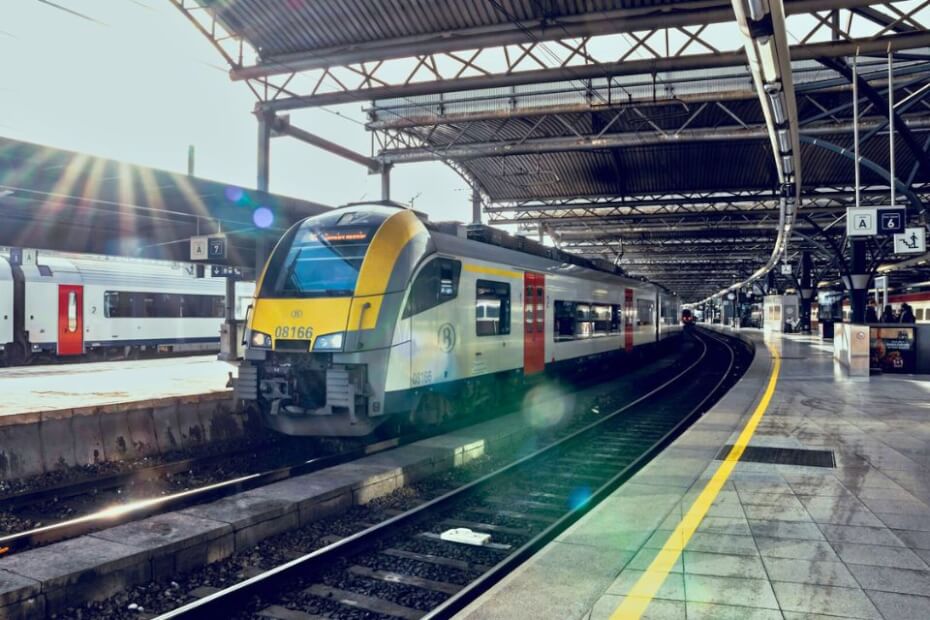
Belgium is enhancing its border security by passing a law that deploys up to 100 Frontex border guards at its entry points.
This includes airports, seaports, the Eurostar Tunnel, and Brussels Midi Station, the primary hub for the train service to Britain.
Brussels’ Midi Station is a crucial entry point for many British and EU travelers.
Frontex is the European Union Border and Coast Guard Agency that manages the EU’s external borders.
The Belgian Federal Parliament passed the bill on 2 May, voted 68 to 11. The Belgian Council of State had also already approved it.
Some had dubbed the bill the “Frontex Law,” as it also allows Frontex agents to arrest, detain, and refuse entry to migrants.
This means Frontex could also deport and escort migrants compelled to return to their country of origin.
The bill marks the first time the EU border agency has been empowered to conduct such activities at Belgium’s entry points.
However, they can only exercise such powers in the presence of a Belgian Federal police officer.
Belgium’s Minister of Justice and the North Sea, Paul Van Tigchelt, and Annelies Verlinde, Minister of the Interior, Institutional Reform and Democratic Renewal of Belgium, proposed the bill at the beginning of April.
The law also aims to strengthen the country’s border security and contribute to the overall security of the European Union.
Belgium’s Frontex Law came a month after the EU Parliament voted in favor of a more unified asylum and migration policy.
Frontex Law could lead to abuse, human rights violations
Ideally, Frontex border guards would assist the local Belgian police and follow orders from Belgian authorities.
However, legislators and civil society organizations have raised concerns that the bill’s wording is vague and not clear enough.
They are worried it may lead to the EU border agents acting unsupervised, resulting in abuse and human rights violations.
The Brussels Times has called it a “dangerous precedent,” citing Frontex’s history of mistreating migrants and asylum seekers.
Opposing Members of the Parliament contested whether Frontex agents could only make arrests at specific entry points or anywhere on Belgian soil.
There were also concerns about whether the EU border agents would be allowed to carry firearms like local police.
Refugee charities had criticized the bill for giving Frontex equal powers to Belgian federal authorities.
“This current law gives too much leeway to the next government, despite knowing that Frontex does not have too good a track record,” Thomas Willekens of Refugeework Flanders (Vluchtelingenwerk Vlaanderen) told The Brussels Times.
The Belgian government said it is working on a Royal Decree to define the scope and powers of Frontex border guards more precisely.
How it will affect travel between the UK and Belgium
The European Conservative says the new law “could set a precedent for the Europeanisation of border security across the EU.”
The deployment of Frontex agents follows increased fears of migrant crimes and a shortage of staff at transport hubs.
Whether Brussels’ Frontex Law will affect Eurostar trips between the UK and EU remains unclear.
Brussels’ Midi Station is a gateway into post-Brexit United Kingdom (UK), similar to gateways between the UK and France.
British and French authorities already have disagreements with asylum seekers crossing the English Channel after Brexit.
Ireland has started to be part of this row as asylum seekers flee to Dublin via Northern Ireland to escape the UK’s Rwanda Act.
In February 2024, the British government and Frontex agreed on a working arrangement to coordinate and fight against illegal migration.
One of Frontex’s duties is collaborating with EU member states and neighboring countries to combat illegal migration and cross-border crime.
It also mainly focuses on guarding the EU’s southern border.
Despite collaborations with Northern European police, it is called on occasional missions to the Western Balkans and North Africa.
Despite being an official agency, Frontex has been accused of human rights violations against asylum seekers.
Travel Tomorrow reported that in February, human rights organization 11.11.11. accused Frontex of conducting 346,004 illegal pushbacks in 2023
A pushback is when a migrant is turned away from a country’s border before they can apply for protection. This is illegal under both European and international law.

